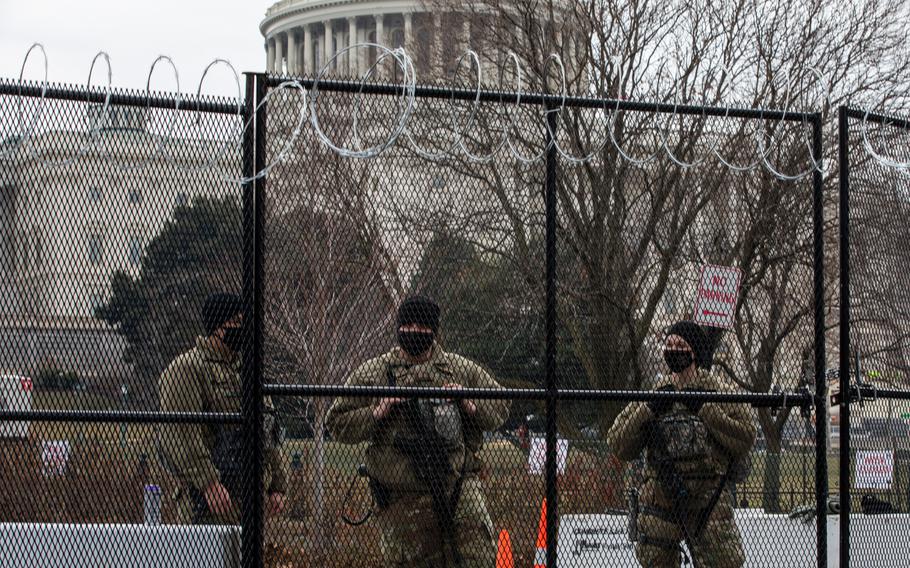
Michigan National Guardsmen with the 210th Military Police Battalion secure a gate at the U.S. Capitol in Washington, Feb. 15, 2021. Rioters stormed the Capitol about a month earlier, including some veterans who were later charged and sentenced for their actions. (U.S. Army/R.J. Lannom)
WASHINGTON — The Defense Department investigated 183 allegations of extremist activity among service members in the past year, including 78 cases of service members advocating for the overthrow of the U.S. government, according to a Pentagon audit published Thursday.
In addition to the 78 allegations involving troops wanting to overthrow the U.S. government, the inspector general for the Defense Department reported 44 instances of service members advocating for terrorism and 22 cases of service members advocating for or committing violence to achieve political, religious or discriminatory goals.
Three allegations were made about troops advocating for or committing violence to deprive people of their rights, and 32 allegations centered on troops advocating for widespread discrimination of people based on race, religion, sex, gender identity or sexual orientation.
Four allegations involved service members encouraging other military personnel or DOD civilians or contractors to break the law or disobey orders to disrupt military activities.
The report comes after the inspector general in August released a report that showed military recruiters sometimes skipped steps to screen out enlistees affiliated with criminal gangs or extremist groups. That audit found 53 out of 129 applicants, or 41%, weren’t interviewed about their ties to extremist groups or gangs.
Defense Secretary Lloyd Austin has made extremism a priority within the Defense Department, including efforts to train troops to recognize and report indications of extremism among their fellow service members.
The Pentagon’s focus on extremism came largely in the wake of the Jan. 6, 2021, attack on the U.S. Capitol by supporters of then-President Donald Trump. The attack included a handful of service members and dozens of veterans among the mob that sought to stop Congress from certifying President Joe Biden’s election victory.
Pentagon officials have said they know extremist groups, especially far-right and anti-government organizations, seek out military veterans and push their young followers to enlist so they can receive military training.
The Army had the most allegations in fiscal year 2023 with 130 soldiers suspected of participation in extremist activity. The Air Force suspected 29 airmen. The Navy and Marine Corps reported 10 service members each. The Space Force also reported four guardians for extremism.
The Army uses several independent databases to collect information, “making it impossible to track” the number of allegations that weren’t referred for investigation, the report states.
The Air Force also lacks a single reporting system, and the Air National Guard was inconsistent at reporting allegations that it received because of the complexity of cases in which members weren’t activated at the time of the alleged misconduct.
The Navy said reporting the data to the inspector general was “time consuming” and multiple policies “created confusion.”
The report documented 275 allegations, including 68 that were unsubstantiated, 136 that remain open cases and 69 that led to service members receiving some sort of punishment, including two courts-martial and 19 involuntary discharges. The report did not specify what types of allegations led to disciplinary measures.
The report also states the Defense Department investigated 58 allegations of gang activity across the military.
“Until implementation of standardized processes occurs, the DOD will have inconsistent tracking of prohibited activities participation, problems identifying, collecting, and reporting data from multiple, decentralized systems, and difficulty validating the accuracy of reported data,” the report states.